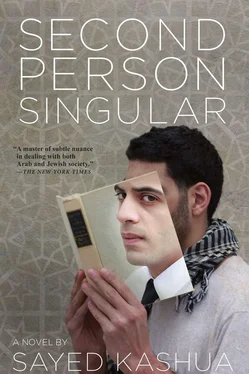Um-Bassem left her house and shuffled, with the help of her cane, toward me.
“Let me help you.” I said, approaching her.
“No strength left,” she said, “you see what humans are?” She leaned on my left arm, the one I had extended to her, and hobbled over to a plastic chair in the courtyard near our house. She panted and wiped sweat from her brow with a white handkerchief. My mother came outside with a brass tray full of skewered lamb and kebab.
“You must eat with us, um-Bassem,” my mother said, knowing that that would never happen. It never had and it never would. The orphan’s food, it says in the Koran, is not to be devoured.
“I wish I could,” she said, “but you know what my stomach is like these days. I can’t eat a thing beside yogurt.”
“We have that, too,” I said, and um-Bassem laughed.
“Thanks, I just had two cups at home.”
Mom sat on a chair next to um-Bassem. I flattened out the mound of charcoal, set down the grill, and rubbed it with a half onion that had been dipped in olive oil.
“So,” um-Bassem said, “months go by and you don’t visit?”
“I’m really busy,” I said.
“Spare me,” um-Bassem said. My mother sat up straight in her chair. “You think that I don’t know?”
“Know what?”
“There’s only one thing that keeps a man away from his mother,” she said.
I said nothing.
“Come on, come out with it already, is she pretty? She must be pretty. You are a good-looking man and you will take yourself a pretty woman.”
I started with the kebab. I lay them down on the grill and a cloud of smoke wafted up into the air. I placed a tomato-and-onion skewer on the side.
“What are you embarrassed about?” um-Bassem asked, “There are no strangers here.”
“No,” I said, “I really have been busy.”
“So there’s no girl? I don’t believe it.”
All I did was shake my head and flip the kebab and the vegetable skewer.
Um-Bassem exchanged looks with my mother, inhaled deeply, and started again. “Now that you’ve finished school and you have a profession it’s time to find the right bride, no?” She directed the question at my mother, who nodded impatiently.
Soon it would all start again. Um-Bassem would voice the words that my mother could not say, make the requests my mother could not make. Bride, home, land — for how long will you continue to surrender to your father’s family? When will you demand what is rightfully yours? How will you ever marry without land? Who would ever agree to marry someone who has no home? You lack for nothing and you deserve the very best. What are you worried about? It’s your father’s land.
“I think the kebab is ready,” I said, and my mother rushed over with a plate.
“How long will this go on?” um-Bassem asked and did not wait for an answer. “It’s time you demand what’s rightfully yours.”
“Nothing’s rightfully mine.”
“It most certainly is,” she said, raising her voice. “It’s yours and it’s also your mother’s.”
“My mother can demand what’s hers on her own.”
“Me,” my mother said. “Why would they listen to me?”
“You should have thought about that twenty years ago,” I said and immediately regretted it but did not apologize, making do with an apologetic look toward my mother, who was quiet, staring into the fire. Um-Bassem mumbled a prayer. After that it was silent. A round of fireworks exploded in the skies above the village.
I set the lamb skewers on the grill, spacing them evenly, knowing that they would not be touched. The thick smell of burning fat filled the courtyard. The wind changed directions and the smoke blew straight into my eyes.
CLEAN DIAPER
I went from being the roommate who spent too much time at home to the invisible roommate. Most days I came home from work at around four thirty, took a shower, got dressed, got my bag together, and left at around six fifteen for Yonatan’s. My time with Wassim and Majdi was cut down to the rare weekends when they were off and didn’t go home, which happened around once every two months.
Occasionally, I still considered quitting on Yonatan. I didn’t really need the money. My social worker salary was enough to live on and the caretaker money went completely untouched. I did not feel the need to save up at the time, though. I had no plans for the future. The thought of the long hours alone in the apartment, waiting for Majdi and Wassim to come back from work, was what convinced me not to quit.
Also, I started to really enjoy my time there, up in that attic on Scout Street. The physical part of the job got easier, much more like what Ayub and Osnat had described: quick dinner for Yonatan, jelly hydration, and a long deep sleep, generally till the morning.
Osnat asked me every once in a while to switch with her on the weekend, or to come in a bit early, at six or even at five, and I was always happy to oblige. Sometimes it worked out that I would spend twenty-four hours straight with Yonatan. Osnat probably thought I agreed so readily because I wanted to work longer hours, to make a little more money, but the truth is that I was willing to take her place because I had nothing else to do and I preferred spending time with Yonatan in his warm room to being alone in the cold, empty apartment in Beit Hanina.
The day shift with Yonatan was not particularly tricky either. After breakfast, which consisted of the same jar of food and shot of jelly, I would put Yonatan in the shower, which was never easy but had gotten significantly less difficult, and wash him with liquid soap and a soft sponge, hitting spots that I don’t even touch on my own body. Lifting his head and cleaning his neck, cleaning behind his ears,
in his crotch. I would even bend over and meticulously clean his bottom through the hole in the chair. I’d wash his hair with baby shampoo. Then I’d pat him down with a towel until he was completely dry because Osnat told me that anything less would guarantee bedsores and all sorts of funguses. I dried him everywhere, even tugging the towel back and forth between his toes. When he was good and dry, I would rub a special cream on his body, occasionally massaging his muscles as I had seen Osnat do.
Then I’d transfer him to the bed, diaper him, dress him in clean pajamas, put him in the wheelchair with the headrest, and move him over to the window. Sometimes I’d turn on the radio to Galgalatz, which offered a constant medley of popular music and traffic reports.
Soon enough I realized that Yonatan had more than one frozen expression — sometimes he smiled, or did something that looked like a smile with his lips, and sometimes he made noises. I could tell by the sounds he made when he was pleased or upset. When he was tired of sitting by the window, I knew it, and I moved him back to the bed, and when he was tired of his position, I rotated him.
Even though it wasn’t easy, I learned how to change his diaper and keep the bed clean. He had to be pushed over onto his side with one hand, held in place so that he wouldn’t flop back down, and then with the other hand you had to take off the diaper, wipe him, sprinkle talc on his bottom, and then lay the new diaper out so that the straps were open and ready, and only then allow him to flop back down on his back. Then you could close the diaper, inserting two fingers to make sure that it was not too tight or too loose.
All this was done with latex gloves and immediately afterward I washed my hands with soap. Still, when Yonatan went to sleep I would go back into the bathroom, scrub myself up to my elbows, dig my fingernails into the bar of soap, and disinfect my hands for a very long time under a stream of hot water.
The thing I tried to avoid most was Yonatan’s stare. I liked it better when his eyes were shut. There was something scary about them when they were open. Everything about this limp creature seemed so healthy: his straight, light brown hair, which was cut every two weeks by a barber who came to the house; his smooth, pale face, electrically shaved by Osnat once every three days; and those wet brown eyes. Everything was as it should be. Yonatan was a good-looking guy.
Читать дальше












